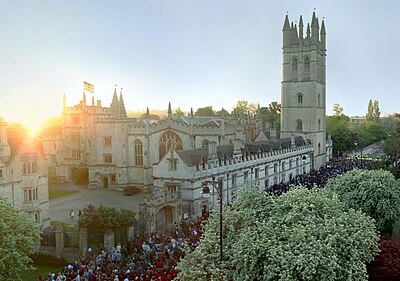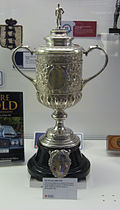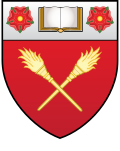| Main page | Indices | Projects |
The University of Oxford portal
The University of Oxford is a collegiate research university in Oxford, England. There is evidence of teaching as early as 1096, making it the oldest university in the English-speaking world and the world's second-oldest university in continuous operation. It grew rapidly from 1167, when Henry II banned English students from attending the University of Paris. After disputes between students and Oxford townsfolk, some Oxford academics fled northeast to Cambridge, where, in 1209, they established the University of Cambridge. The two English ancient universities share many common features and are jointly referred to as Oxbridge.
The University of Oxford is made up of 43 constituent colleges, consisting of 36 semi-autonomous colleges, four permanent private halls and three societies (colleges that are departments of the university, without their own royal charter), and a range of academic departments which are organised into four divisions. Each college is a self-governing institution within the university, controlling its own membership and having its own internal structure and activities. All students are members of a college. The university does not have a main campus, but its buildings and facilities are scattered throughout the city centre. Undergraduate teaching at Oxford consists of lectures, small-group tutorials at the colleges and halls, seminars, laboratory work and occasionally further tutorials provided by the central university faculties and departments. Postgraduate teaching is provided in a predominantly centralised fashion.
Oxford operates the Ashmolean Museum, the world's oldest university museum; Oxford University Press, the largest university press in the world; and the largest academic library system nationwide. In the fiscal year ending 31 July 2023, the university had a total consolidated income of £2.92 billion, of which £789 million was from research grants and contracts.
Oxford has educated a wide range of notable alumni, including 31 prime ministers of the United Kingdom and many heads of state and government around the world. As of October 2022,[update] 73 Nobel Prize laureates, 4 Fields Medalists, and 6 Turing Award winners have matriculated, worked, or held visiting fellowships at the University of Oxford, while its alumni have won 160 Olympic medals. Oxford is the home of numerous scholarships, including the Rhodes Scholarship, one of the oldest international graduate scholarship programmes. (Full article...)
Selected article
The 1874 FA Cup Final was played between Oxford University A.F.C. and Royal Engineers A.F.C. on 14 March 1874 at Kennington Oval in London. It was the third final of the world's oldest football competition, the Football Association Challenge Cup (known in the modern era as the FA Cup). Both teams had previously reached the final but been defeated by Wanderers F.C. The Engineers had reached the final with comparative ease, scoring sixteen goals and conceding only one in the four previous rounds. Oxford's opponents in the earlier rounds had included two-time former winners Wanderers. The final was decided by two goals from Oxford in the first twenty minutes. Their opponents had spent two weeks training for the match, an innovative concept at the time, but were repeatedly thwarted by Charles Nepean, the Oxford goalkeeper. The Engineers were said to have missed their best back, Lieut. Alfred Goodwyn, who had been posted overseas. The 1874 final was the only occasion upon which Oxford University won the FA Cup; the team made further appearances in the 1877 and 1880 finals, but lost on both occasions. (Full article...)
Selected biography
Selected college or hall
Harris Manchester College, on Mansfield Road just to the east of the city centre, was established in 1786 in Manchester, and was initially called the Manchester Academy. It provided education to religious non-conformists who at that time were not allowed to study at the universities of Oxford or Cambridge. Between 1803 and 1840, the academy was based in York to accommodate its principal, Charles Wellbeloved, who would not move to Manchester. After a period in London (1853 to 1889), it moved to Oxford, with buildings designed by the architect Thomas Worthington opening in 1893. The chapel has ornate wood carvings and notable stained-glass windows by Sir Edward Burne-Jones and William Morris. It became a Permanent Private Hall of the university in 1990, and gained full college status in 1996. The college's name reflects its history in Manchester and a donation from Lord Harris of Peckham. It has about 110 undergraduate students and 40 postgraduates, all of whom are mature students (over 21), and is one of the smallest colleges at Oxford; the Principal is the theologian Ralph Waller, who is also Director of the Farmington Institute for Christian Studies which is based at the college. (Full article...)
Selected image

Did you know
Articles from Wikipedia's "Did You Know" archives about the university and people associated with it:
- ... that the statue of the Virgin and Child in the porch of the University Church of St Mary the Virgin (pictured) was cited as evidence in Archbishop Laud's execution trial, and has bullet holes made by Oliver Cromwell's troops?
- ... that the great-granddaughter of Mahatma Gandhi, Leela Gandhi, is a senior lecturer at La Trobe University in the English program?
- ... that British Conservative MP Richard Hornby unsuccessfully challenged former Prime Minister and Labour leader Clement Attlee before securing a safe seat?
- ... that cyber law author and professor Jonathan Zittrain co-founded StopBadware.org to distribute the task of collecting data about malware to Internet users at large?
- ... that the military theories of the 18th-century Welsh soldier Henry Lloyd were studied by George Washington and George S. Patton?
Selected quotation
Selected panorama
Wikimedia
The following Wikimedia Foundation sister projects provide more on this subject:
-
Commons
Free media repository -
Wikibooks
Free textbooks and manuals -
Wikidata
Free knowledge base -
Wikinews
Free-content news -
Wikiquote
Collection of quotations -
Wikisource
Free-content library -
Wikiversity
Free learning tools -
Wikivoyage
Free travel guide -
Wiktionary
Dictionary and thesaurus














